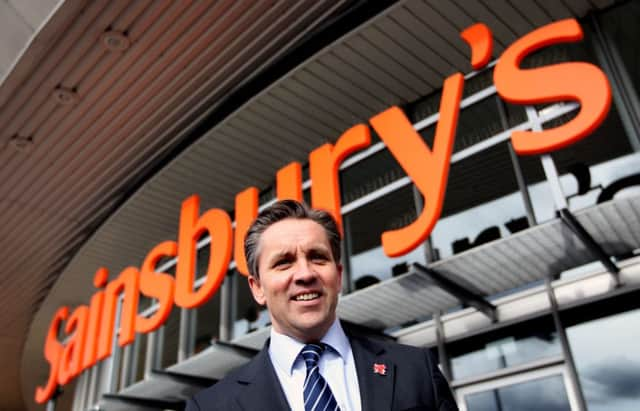Sainsbury’s boss ‘not leaving on low’ despite slump


King, who leaves next month after what is widely seen as a successful decade in charge, said: “I would have preferred sales to be growing.
“I don’t think it’s leaving on a low. If my [tenure] was decided on one quarter, that would be a little bit sad. I’m leaving at a time when, although the headline number is negative, our competitive position is very strong.”
Advertisement
Hide AdAdvertisement
Hide AdHis comments came as Sainsbury’s posted that underlying same-floorspace sales were down 1.1 per cent in the 12 weeks to 7 June. It was an improvement on the previous three months when like-for-like sales fell 3.1 per cent, the first decline in nine years.
Total sales in the period, including newly opened space, rose 1 per cent compared with the same period last year.
City supermarket analysts said the like-for-like sales fall was the latest evidence that Britain’s big four food retailers, which also comprise Tesco, Asda and Morrisons, were being squeezed by strong growth at discounters Lidl and Aldi. Further turning the screw, upmarket chains Marks & Spencer and Waitrose are also gaining market share.
Industry data has shown the food retailing sector growing at its slowest rate in a decade, while Morrisons’ boss Dalton Philips has called it the toughest grocery climate “in a generation”.
Morrisons and Tesco, in particular, have responded with blanket price promotions, currently amounting to £3 billion over three years at the former and £200m this year at the latter.
However, King repeated his earlier claim that there was an element of “phoney war” about such initiatives as all supermarkets cut thousands of prices regularly week by week without making major statements.
“We will stand toe to toe on that [price]. We have the strongest price position we have had in a very long time,” he said.
King is seen as having transformed Sainsbury’s from a declining force from the mid-1990s when Tesco overtook it, to be vying with Asda for the number two slot in the sector.
Advertisement
Hide AdAdvertisement
Hide AdIn his valedictory results to the City, King said he believed consumers would remain cautious in their spending, shopping more at convenience stores and online, both growth areas.
He said he believed these trends would continue even if the consumer outlook improved, and that there would be no return to consumer behaviour which prevailed before the lengthy downturn began in 2008.
Sainsbury’s said its clothing business achieved double-digit like-for-like sales growth in the quarter, including its best-ever sales week in womenswear.
Lingerie sales rose 18 per cent on a year earlier, while childrenswear was 15.8 per cent higher. The group also opened another 27 convenience stores.
Shares in the the company lifted 1 per cent to 333p amid relief that the decline in sales was lower than worst City expectations.
Phil Dorrell, director of retail consultants Retail Remedy, said: “Even when the news is bad, Sainsbury’s has an uncanny knack for reliability.
“Its modest drop in sales was both accurately predicted and – seen in the context of a sector suffering the poorest growth numbers for a decade – still pretty respectable.”